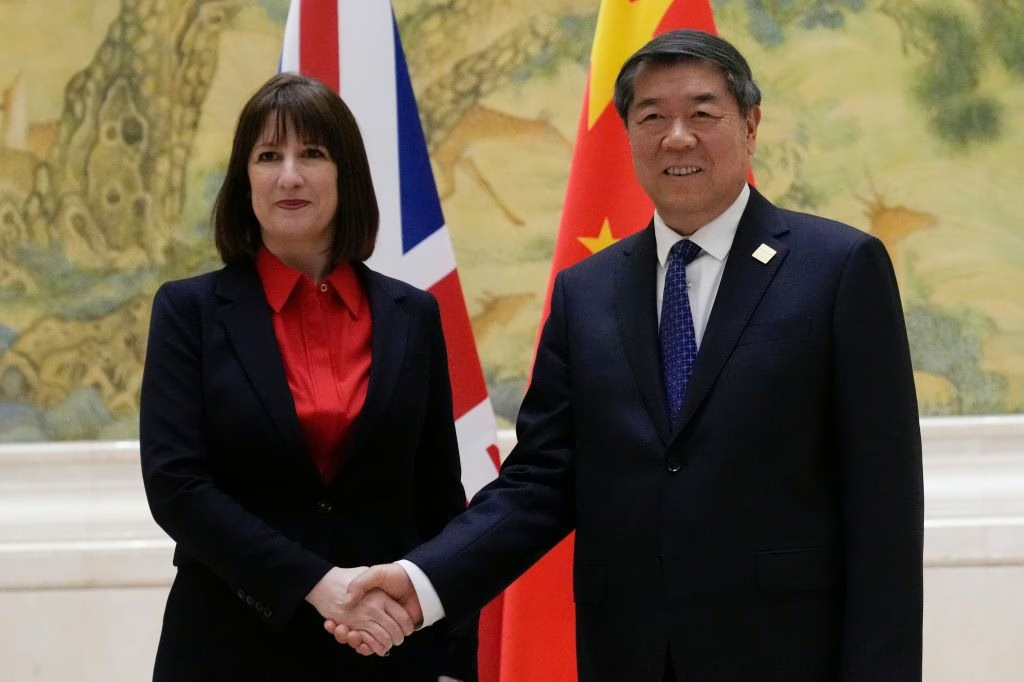In the face of criticism for travelling to China amid domestic “financial market turmoil”, chancellor Rachel Reeves insisted at a press conference in Beijing on 11 January that she would stick to the fiscal rules set out in the Budget in October, says Politico. Reeves wants to revive economic ties with China after “years of tension” with the previous Tory government over security concerns and human rights issues.
A healthy relationship with Beijing is “squarely in our national interest”, she said, as she announced agreements “worth £600 million to the UK economy over the next five years”. Writing in The Times, Reeves said, “We cannot ignore the fact that China is the second-largest economy worldwide and our fourth-largest trading partner, with exports supporting close to half a million jobs in the UK… Choosing not to engage with China is therefore no choice at all”. Both sides agreed to deepen cooperation across areas including financial service, trade, investment and the climate. Anglo-Chinese trade is currently worth more than £87 billion a year.
What does the chancellor’s China visit mean for the UK?
Critics “poured scorn” on Reeves’s puny deal, says Greg Heffer in the Daily Mail. At a time when the US and Europe are “toughening up on China”, this visit has made us “the laughing stock of the Western world”, former Tory leader Iain Duncan Smith told The Sun. By “courting” our “worst adversary”, this government risks “making a massive strategic blunder”, says Matthew Henderson in The Telegraph. The US and other democratic governments realise that China increasingly poses a risk to their national interests. Central to this risk is that the ruling Communist Party “uses economic engagement as a geostrategic weapon” to compete unfairly with its democratic rivals. Its aim is to achieve “not only economic, but also political, security and military hegemony”. In this context, it seems “distinctly imprudent” for Reeves to “parrot” China’s language about a “consistent, respectful relationship”. And all for a “notional” £600 million, “less than a thousandth of NHS expenditure over the same period”.
Sign up to Money Morning
Don’t miss the latest investment and personal finances news, market analysis, plus money-saving tips with our free twice-daily newsletter
Don’t miss the latest investment and personal finances news, market analysis, plus money-saving tips with our free twice-daily newsletter
An area of particular concern is UK energy generation, says Max Kendix in The Times. Energy secretary Ed Miliband is also due to visit China to “expand and deepen” partnerships. Chinese firms have funded or provided parts for at least 14 of the 50 offshore wind-farm projects in operation or late in development; firms owned by the Chinese government have large stakes in three of these. Up to 40% of our solar panels were made by Chinese firms linked to forced labour. Richard Dearlove, former M16 chief, warned that China’s involvement allows it to “reprogram” any components connected to the energy grid “without our control”.
It is “alarming” that “cosying up to China” in this way “may genuinely be the best idea for growth that Labour has to offer”, says The Telegraph. At a time of a hawkish US, an increasingly aggressive Russia and a China that is on the rise, it looks “less like a thought-out plan and more like an act of desperation. For the good of the country, we should hope that Labour finds new ideas soon”.
This article was first published in MoneyWeek’s magazine. Enjoy exclusive early access to news, opinion and analysis from our team of financial experts with a MoneyWeek subscription.

Leave a Reply